|
 The convoy consisted of more than 40 military
vehicles, many driven by military veterans from all across the
United States, as well as six from New Zealand and one from Belgium.
The group is traveling Route 66 from Chicago to Santa Monica,
sharing their vehicles and military knowledge with communities where
they make stops, and also honoring all military veterans in the
process. The convoy consisted of more than 40 military
vehicles, many driven by military veterans from all across the
United States, as well as six from New Zealand and one from Belgium.
The group is traveling Route 66 from Chicago to Santa Monica,
sharing their vehicles and military knowledge with communities where
they make stops, and also honoring all military veterans in the
process.
The group left out of the DuPage County Fairgrounds on Saturday, and
stayed over in Pontiac on Saturday night. Sunday morning they made
their way to Atlanta, where they stopped for a long rest and lunch
at the Palms Grill. In the afternoon, they continued their trek
through Logan County following the 1926 route of the historic
highway, which brought them into the downtown area of Lincoln, then
on to the Mill on 66 Museum for another stop.
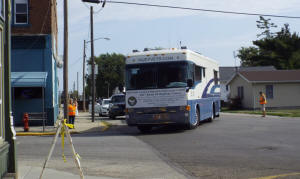
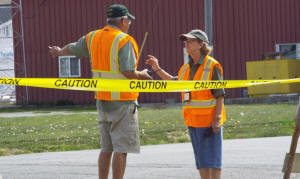
The group arrived in Atlanta in two stages. The first group to
arrive consisted of a number of lean vehicles. In the fashion
expected from a military unit, the advance team set up people in key
locations to lead the convoy into town. Watchmen were set at the
intersection north of Atlanta, to steer the group into town. Others
stood watch on the street the convoy would drive in on, and others
still, directed the “rack and stack,” style parking that filled a
full city block in Atlanta with military vehicles, six to 10 deep
and four wide.
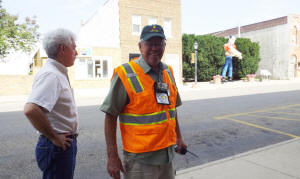
According to Brad Nelson, Section One Leader, who arrived ahead of
the convoy, the average highway speed for the convoy is about 20
mph, with a maximum speed of 35 mph. The group will be traveling
across the country at a snail’s pace compared to modern day
vehicles, and anticipate they will be on the road a total of 29 days
getting from Chicago to California.

Nelson said that the oldest vehicle in the convoy was a 1942 MP
(military police) Jeep, and the young buck in the group would be a
1994 20-ton heavy truck.
As the convoy arrived in Atlanta, they were directed into their
parking spots, with the excess vehicles spilling over onto adjacent
streets. As folks exited their vehicles, they were happy and excited
to talk about their trip.
This is the fourth such convoy. The first convoy was held in 2009,
at the 90th anniversary of the first U.S. Military convoy crossing
the nation from Washington D.C. to San Francisco, California.
In 2012, the group traveled the “Trail of ‘42” on the Alaska Highway
from Dawson Creek to Fairbanks, Alaska. In 2015 the third convoy
followed the 1920 U.S. Army route across the country on the Bankhead
Highway from Washington D.C. to San Diego, California.
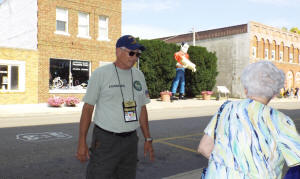
Rick Constien, one of the convoy participants and MVPA members,
talked about that first trek across the country in 1919. The convoy
followed that trail on their 2009 trip on finished highways.
However, he said in 1919, there were no finished roads west of St.
Louis, and the group actually built roads as they went.
Constien said that the MVPA is a worldwide
organization with chapters in nearly every country. There is an
annual convention in the United States, each year choosing to meet
in a different part of the country. MVPA members come to the
conventions with their vehicles and enjoy a time of sharing what
they know, some first hand as veterans, and others as avid
collectors, about their particular vehicles.
[to top of second column] |

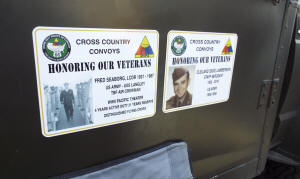
It was also noted that the convoy events are often considered by the
group to be the world’s longest veteran parade. Many of the
vehicles, once parked, were decorated with placards honoring
specific veterans.
It was also explained that the convoy travels with its own team of
mechanics. With many of the vehicles being antiques or vintage, the
convoy needs mechanics who can check over the vehicles at the end of
each day and address any reported issues from the drivers. Sometimes
the mechanics will work all night so as to have every vehicle ready
to hit the road come morning.

In Atlanta, the group was met by several spectators,
some coming from outside of town, just for the chance to see all
these vehicles in one spot. The convoy drivers were happy to visit
with everyone. One couple, Jack and Beverly Burke from Texas had
driven to Chicago to be a part of the convoy. They enjoyed hearing
about some of the Route 66 history in Logan County and were amused
by the story of the Paul Bunyon statue in Atlanta.
Constien is also a bit of a history buff, and enjoyed sharing with
the Burkes information about the history of Route 66 in the days of
Al Capone and noted that the Mill on 66, the next stop for the
convoy, was a favorite hangout outside of Chicago for the notorious
gangster.
The convoy stayed in Atlanta through the lunch hour, having a
special luncheon upstairs at the Palms Café. They then left Atlanta
and traveled on to Lincoln and the Mill. Traveling Route 66 included
driving through Lincoln and making their way to the Mill via the
downtown area and Fifth Street.
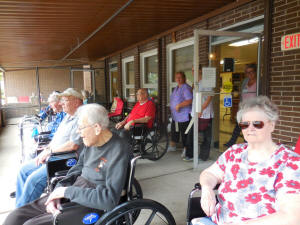
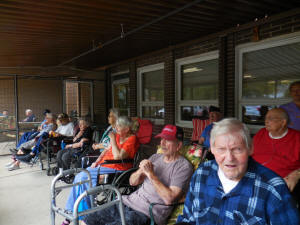

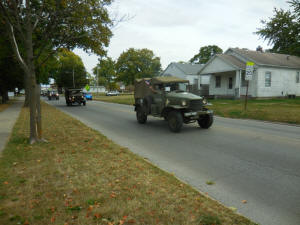
Rebecca Johnson of St. Clara’s Manor on Fifth Street shared photos
of residents gathered outside the Manor to see the convoy go past.
It was also noted at the Railsplitter events at Postville Courthouse
when the convoy would be passing through, and some guests at that
festival took advantage of the opportunity to watch as the vehicles
passed by.
The convoy visited the Mill for a short period of time before
traveling on to Springfield where they spent the night at the
Illinois State Fairgrounds.
The MVPA does have a website, where one can read more about the
organization and also follow the progress of the convoy as it
crosses the United States. Access that website at
http://www. mvpa.org/
[Nila Smith with Photos at St.
Clara's Manor by Rebecca Johnson] |